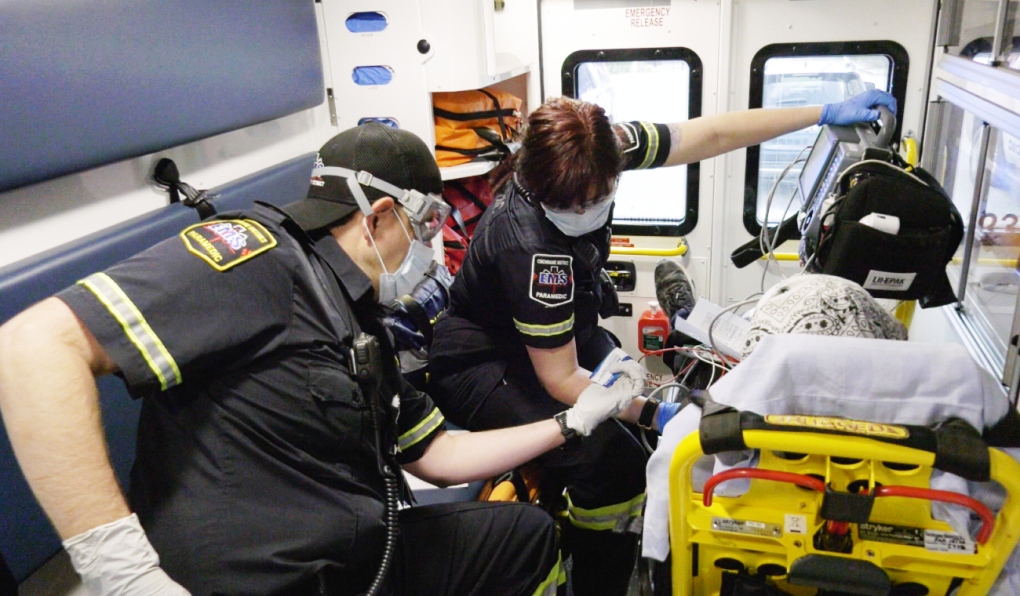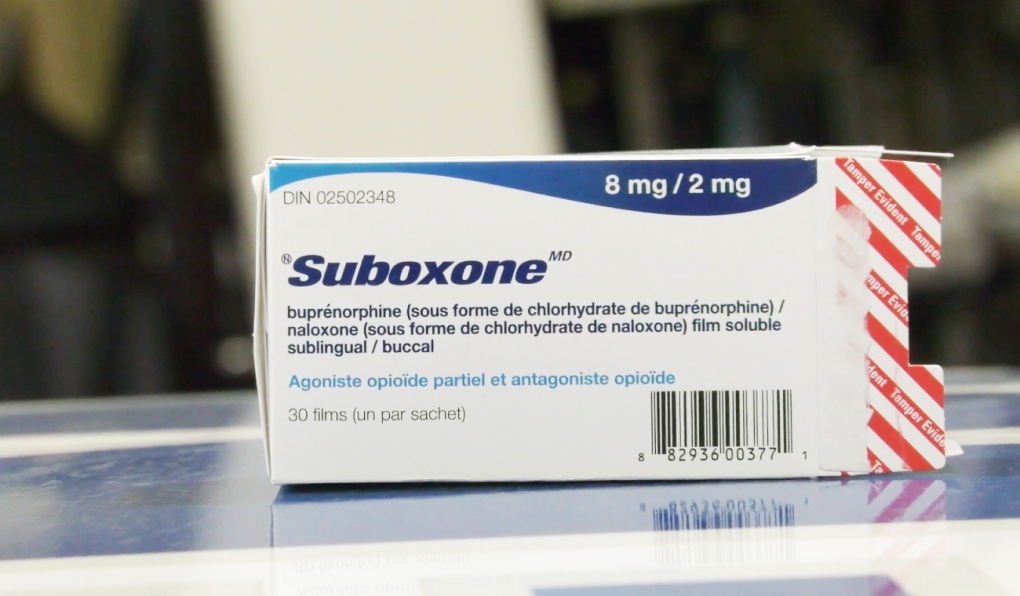Northern Ont. EMS testing new opioid drug treatment program
“You overdosed and you were given narcan.”
That’s what Cochrane District EMS operations commander Derrick Cremin told a homeless man, after he had been revived from an opioid overdose.
Paramedics found the man unresponsive outside a local church last week, later learning that he uses fentanyl.
Cremin then went through a checklist of withdrawal symptoms to determine whether the man was eligible for an opioid drug therapy that could save his life.
“We can give you something called Suboxone,” Cremin told the patient.
He then gave him two film tabs of buprenorphine-naloxone, known by the brand name Suboxone.
Without it, the patient may not have survived the week, according to Seamus Murphy, deputy chief of standards and community services.
‘We want to keep people safe’
While lifesaving treatments like naloxone can revive someone from an overdose, Murphy said it also brings on severe withdrawal.
Patients then turn straight to opioids for relief. The condition causes a need to consume more or risk death from withdrawal — as long as the opioid doesn’t kill the user first.
Suboxone can quell those urges by delivering enough opioids to satiate the craving without causing euphoria, along with offering about 24 hours of protection from another overdose.
“We want to keep people safe and that’s what this does,” said Murphy.
“It’s an opioid agonist therapy that treats people that suffer with opiate use.”
 Cochrane District EMS are offering overdose patients a new way to recover from opioid overdoses that increases their chances of overcoming addiction. (Sergio Arangio/CTV News)
Cochrane District EMS are offering overdose patients a new way to recover from opioid overdoses that increases their chances of overcoming addiction. (Sergio Arangio/CTV News)
Patients then have a clearer mind to make a better choice, he said, ideally choosing to enter into addiction treatment.
First to administer it in Canada
Suboxone is classified as a narcotic and Cochrane District is the first paramedic service in Canada to carry it and administer it in the field.
Only a select few staff are currently allowed to handle it —Cremin is one of them — but all of the service’s paramedics are trained on its use.
Ontario’s Ministry of Health gave the service the green light earlier this month to test the treatment method, with the goal of revolutionizing how EMS respond to overdoses.
Cochrane District EMS are offering overdose patients a new way to recover from opioid overdoses that increases their chances of overcoming addiction. (Sergio Arangio/CTV News)Cremin said it’s a reassuring tool to have.
“Before, we would treat these patients, offer them (naloxone) … and they would refuse treatment or transport to the hospital,” he said.
“We really didn’t know what happened to them after the overdose. Now, we know that they’re being transported and they’re going to withdrawal management and, hopefully, seeking the help.”
Having administered Suboxone to at least eight patients, with several agreeing to further treatment at the Timmins and District Hospital’s addiction services department, the hospital’s addictions and mental health program manager, Pat Nowak, said he sees major potential.
 Cochrane District EMS are offering overdose patients a new way to recover from opioid overdoses that increases their chances of overcoming addiction. (Sergio Arangio/CTV News)
Cochrane District EMS are offering overdose patients a new way to recover from opioid overdoses that increases their chances of overcoming addiction. (Sergio Arangio/CTV News)
Chance to turn a life around
It’s a welcome addition in battling the opioid crisis, he said, as staff struggle to curb opioid fatalities in a city that still holds some of the highest numbers in Ontario.
“EMS might be one of the people that come into contact with people who use substances the most,” Nowak said.
“I think providing that extra avenue to get into treatment, into recovery, is a great idea.”
Suboxone may not be a miracle drug that can single-handedly end the opioid crisis, but Nowak said it can certainly offer a gateway to sobriety and a better life for opioid users who truly want to change their lives.
“Someone overdoses and they’re saying, ‘that’s it, no more’ this is the chance to say, ‘it’s right here, right now,’” he said.
Murphy said he has been presenting his research on Suboxone to paramedic services across the country and that at least 10 are interested in adopting the program.
First, his goal is for every ambulance in his service — and then in the province — to be able to carry the drug and for every paramedic to be able to administer it.
o Download our app to get local alerts on your device
o Get the latest local updates right to your inbox
Murphy said it’s an essential tool every paramedic should be able to offer to an overdose victim, as they may not get another chance.
“A life we save today could be a life changed tomorrow and that’s what people have to realize.”
CTVNews.ca Top Stories

'It could be catastrophic': Woman says natural supplement contained hidden painkiller drug
A Manitoba woman thought she found a miracle natural supplement, but said a hidden ingredient wreaked havoc on her health.
WATCH Video shows dramatic police takedown of carjacking suspects chased through parking lot north of Toronto
Police have released video footage of a dramatic takedown of a group of teens wanted in connection with an attempted carjacking in Markham earlier this month.
After hearing thousands of last words, this hospital chaplain has advice for the living
Hospital chaplain J.S. Park opens up about death, grief and hearing thousands of last words, and shares his advice for the living.
DEVELOPING G7 warns of new sanctions against Iran as world reacts to apparent Israeli drone attack
Group of Seven foreign ministers warned of new sanctions against Iran on Friday for its drone and missile attack on Israel, and urged both sides to avoid an escalation of the conflict.
WHO likely to issue wider alert on contaminated cough syrup
The World Health Organization is likely to issue a wider warning about contaminated Johnson and Johnson-made children's cough syrup found in Nigeria last week, it said in an email.
Advocacy groups speak out against domestic violence comments by Nova Scotia minister
Several Nova Scotia groups that assist women are speaking out against comments on domestic violence by Justice Minister Brad Johns, and at least one is calling for his dismissal.
A couple lost their wedding rings during the ceremony. Two strangers found a fitting solution
Every good wedding has to have one teensy, tiny crisis.
'It was all my savings': Ontario woman loses $15K to fake Walmart job scam
A woman who recently moved to Canada from India was searching for a job when she got caught in an online job scam and lost $15,000.
Families to receive Canada Child Benefit payment on Friday
More money will land in the pockets of some Canadian families on Friday for the latest Canada Child Benefit installment.






























